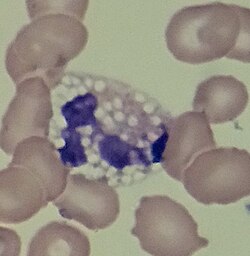Toxic vacuolation
Editor-In-Chief: Prab R Tumpati, MD
Obesity, Sleep & Internal medicine
Founder, WikiMD Wellnesspedia &
W8MD medical weight loss NYC and sleep center NYC
| Toxic vacuolation | |
|---|---|

| |
| Synonyms | N/A |
| Pronounce | N/A |
| Specialty | N/A |
| Symptoms | Cytoplasmic vacuolation in neutrophils |
| Complications | May indicate sepsis, inflammation, or infection |
| Onset | Acute |
| Duration | Variable, depending on underlying cause |
| Types | N/A |
| Causes | Bacterial infection, inflammatory response, drug toxicity |
| Risks | Severe infection, systemic inflammatory response syndrome |
| Diagnosis | Peripheral blood smear |
| Differential diagnosis | Artifact, Alder-Reilly anomaly, Chediak-Higashi syndrome |
| Prevention | Management of underlying condition |
| Treatment | Address underlying cause, supportive care |
| Medication | N/A |
| Prognosis | Depends on underlying condition |
| Frequency | Common in severe infections |
| Deaths | N/A |
Toxic vacuolation refers to the presence of vacuoles in the cytoplasm of neutrophils, which are a type of white blood cell. These vacuoles are indicative of cellular stress and are often associated with severe infections, inflammation, or exposure to certain toxins.
Pathophysiology
Toxic vacuolation occurs when neutrophils are exposed to toxic substances or severe inflammatory stimuli. The vacuoles are formed as a result of the disruption of normal cellular processes, leading to the accumulation of cytoplasmic debris and the formation of vacuoles. This can be seen in conditions such as sepsis, where the body's response to infection leads to widespread inflammation and cellular damage.
Clinical Significance
The presence of toxic vacuolation in neutrophils is a significant finding in the evaluation of a blood smear. It is often seen in conjunction with other signs of toxic change, such as toxic granulation and Döhle bodies. These changes are indicative of a severe systemic response to infection or inflammation and can help guide clinical decision-making.
Diagnosis
Toxic vacuolation is typically identified through the examination of a peripheral blood smear under a microscope. A trained hematologist or laboratory technician will look for the presence of vacuoles within the cytoplasm of neutrophils. The degree of vacuolation can vary, and its presence should be correlated with clinical findings and other laboratory results.
Treatment
The treatment of conditions associated with toxic vacuolation involves addressing the underlying cause. For example, in cases of bacterial infection, appropriate antibiotic therapy is essential. Supportive care, including fluid resuscitation and oxygen therapy, may also be necessary in severe cases.
See Also
Transform your life with W8MD's budget GLP-1 injections from $125.
W8MD offers a medical weight loss program to lose weight in Philadelphia. Our physician-supervised medical weight loss provides:
- Most insurances accepted or discounted self-pay rates. We will obtain insurance prior authorizations if needed.
- Generic GLP1 weight loss injections from $125 for the starting dose.
- Also offer prescription weight loss medications including Phentermine, Qsymia, Diethylpropion, Contrave etc.
NYC weight loss doctor appointments
Start your NYC weight loss journey today at our NYC medical weight loss and Philadelphia medical weight loss clinics.
- Call 718-946-5500 to lose weight in NYC or for medical weight loss in Philadelphia 215-676-2334.
- Tags:NYC medical weight loss, Philadelphia lose weight Zepbound NYC, Budget GLP1 weight loss injections, Wegovy Philadelphia, Wegovy NYC, Philadelphia medical weight loss, Brookly weight loss and Wegovy NYC
|
WikiMD's Wellness Encyclopedia |
| Let Food Be Thy Medicine Medicine Thy Food - Hippocrates |
Medical Disclaimer: WikiMD is not a substitute for professional medical advice. The information on WikiMD is provided as an information resource only, may be incorrect, outdated or misleading, and is not to be used or relied on for any diagnostic or treatment purposes. Please consult your health care provider before making any healthcare decisions or for guidance about a specific medical condition. WikiMD expressly disclaims responsibility, and shall have no liability, for any damages, loss, injury, or liability whatsoever suffered as a result of your reliance on the information contained in this site. By visiting this site you agree to the foregoing terms and conditions, which may from time to time be changed or supplemented by WikiMD. If you do not agree to the foregoing terms and conditions, you should not enter or use this site. See full disclaimer.
Credits:Most images are courtesy of Wikimedia commons, and templates, categories Wikipedia, licensed under CC BY SA or similar.
Contributors: Prab R. Tumpati, MD

